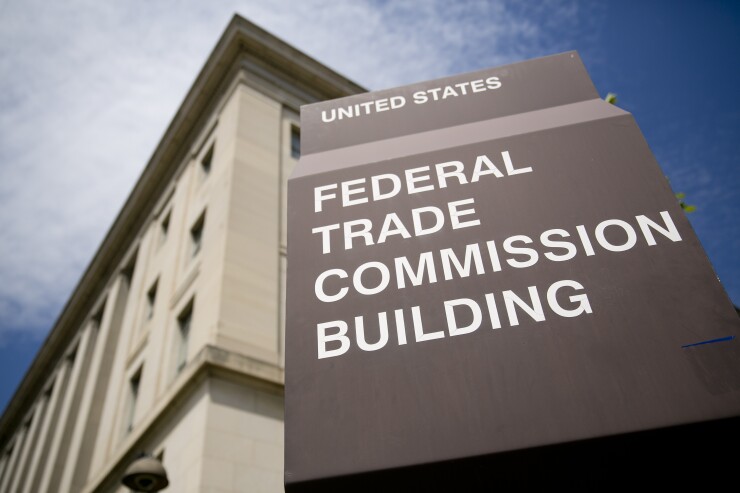
President Biden's vow to help consumers
Consumers feel they have little recourse when they're hit with extra fees for everything from restaurant to salon services, especially when businesses itemize the charges amid rising costs. But payments firms with murky business practices and especially confusing fees are starting to draw more regulatory scrutiny, according to experts.
Because it's so easy for companies to automatically bill customers through online enrollment and within apps, consumers sometimes feel blindsided by higher fees that are the natural result of rising prices and inflation, said Hailey Lennon, a corporate partner in Brown Rudnick's digital commerce group who specializes in fintech and crypto companies.
But there are also many cases where companies are taking advantage of consumers, she said.
"Consumer protection laws haven't changed, but where newer technology mixes with finance, there are areas where gray areas seem to give payment companies more leeway than other kinds of firms in the way they handle disclosures and fine print about fees, and it's driving rising regulatory pressure," Lennon said.
The Federal Trade Commission recently took action against two high-profile payment firms for different consumer violations. In the first case,
The defendants at Waltham, Massachusetts-based
Executives could not be reached for comment by deadline about the settlement.
In the second case, the
One of the most egregious of the alleged violations is that when consumers clicked on Doxo's terms of service page, they were automatically enrolled in a paid subscription to Doxo's $5.99 monthly bill-payment service.
Through their lawyer, Doxo's CEO and co-founder Steve Shivers and its vice president and co-founder Roger Parks said a software-coding issue caused the auto-enrollment of fewer than 2,000 customers. Doxo says it fixed that problem when the FTC brought it to light and methodically corrected each of the FTC's other complaints. It also expanded the fonts and clarified descriptions of its fees and pricing details so they are prominently displayed on Doxo's website, the firm said.
Amid inflation and higher prices, social media is shining a spotlight on rising fees, although there is no evidence of widespread consumer abuse from fees that payment firms pass on to consumers, especially if prices and policies are clear and conspicuous, said Clayton Mitchell, fintech managing principal at the accounting and consulting firm Crowe LLP.
"There's a perception that all fees are junk fees, and there's also the reality that there are costs involved in the services companies are charging. The solution is that payment firms need to risk-assess the fees they intend to charge, make it readily apparent what customers are paying for, and respond to complaints," Mitchell said.
Social media is also playing a growing role in surveilling companies' practices, he added.
"There is heightened sensitivity around fees and growing social media surveillance of fees, and payments firms need to be aware that if their practices break trust with consumers or regulators, they will probably hear about it," Mitchell said.
There is no doubt that the rise of automatic subscription payments in recent years have magnified potentially deceptive practices around fees, said Richard Crone, a principal with Crone Consulting. Firms ranging from gyms to computer security services providers and publishers often make consumers jump through hoops to cancel memberships and unwanted services, he said.
"Some firms are putting fees in smaller text, making it harder for consumers to recognize some charges, and certain fees — like expedited food delivery — promise something where there's no way to verify the food will indeed arrive any faster for an extra $2.99," Crone said.
Consumers who are fed up they're unable to cancel recurring fees or reverse unwanted charges often contact their bank to dispute the transaction — a trend which increases issuers' costs and undermines overall consumer trust in payments, according to Crone.
"The yin and yang of fees and chargebacks can contribute to excessive transaction dispute and chargeback rates, which can cause the card networks to threaten and decline merchants' status, and invite excessively aggressive oversight by the FTC, the Consumer Financial Protection Bureau and others," Crone said.
High-risk payment transactions, which are often associated with gambling and sales of cannabis or adult entertainment, also tend to create headaches for processors because they tend to have higher-than-average dispute rates, he said.
Any firm working with a payments processor or other payments-industry partner needs to conduct rigorous due diligence to ensure the integrity of any third-party operator's practices and policies, according to Crone. Obtaining a Statement on Standards for Attestation Engagements (SSAE 18) is a good place to start, he advised.
"An SSAE 18 audit can provide a third-party review of security and controls, similar to a financial audit, and before finalizing any payment industry partnerships, participants should demand SSAE 18 reports from payment processors and other key parties," Crone said.
In the meantime, the companies targeted by the FTC are moving ahead in different ways.
In February, BlueSnap hired the longtime payments industry veteran Henry Helgeson as CEO, and today the firm announced it has hired Brian Greenfield as chief financial officer.
Doxo disputes some of the FTC's claims.
"Doxo has not violated any laws and intends to vigorously defend itself in court," said Courtland Reichman, managing partner at Reichman Jorgensen Lehman & Feldberg, LLP, who is representing the firm in its dispute with the FTC.
He noted that Doxo worked with the FTC over months to make improvements in the way Doxo discloses its terms, services and fees for paying more than 120,000 different bills on consumers' behalf for a monthly fee.
Doxo, which has existed for 15 years,
"Doxo tried to work with the FTC to avoid litigation and go above and beyond what the law requires, but it appears the FTC is more interested in litigation. Doxo is confident it will prevail," Reichman said.






